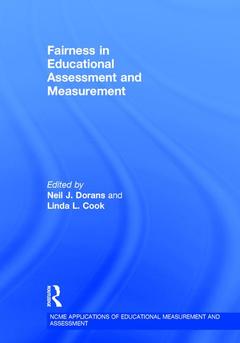Description
Fairness in Educational Assessment and Measurement
NCME APPLICATIONS OF EDUCATIONAL MEASUREMENT AND ASSESSMENT Series
Coordinators: Dorans Neil J., Cook Linda L.
Language: English
Subjects for Fairness in Educational Assessment and Measurement:
Keywords
Neil Dorans; Linda Cook; Multiple Group Confirmatory Factor Analysis; Educational Assessment; DIF Analysis; Educational Measurement; Construct Irrelevant Variance; Testing; Student Growth Percentiles; Fairness; Conduct DIF Analysis; Test Adminstration; Teacher Effectiveness Estimates; Education Technology; Cut Scores; NCME; Test Takers; Fundamental Validity Issue; DIF; Interchangeable Scores; VAM Estimate; CR Item; Test Administration Site; Graduation Test; SGP; RMSD; Derived Scores; Vertical Scaling; Judgmental Standard Setting; Score Comparability; Application Construct; Construct Shift; Developer Construct; English Language Proficiency Scores
Publication date: 09-2016
· 17.8x25.4 cm · Hardback
Publication date: 10-2016
· 17.8x25.4 cm · Paperback
Description
/li>Contents
/li>Readership
/li>Biography
/li>
The importance of fairness, validity, and accessibility in assessment is greater than ever as testing expands to include more diverse populations, more complex purposes, and more sophisticated technologies. This book offers a detailed account of fairness in assessment, and illustrates the interplay between assessment and broader changes in education. In 16 chapters written by leading experts, this volume explores the philosophical, technical, and practical questions surrounding fair measurement.
Fairness in Educational Assessment and Measurement addresses issues pertaining to the construction, administration, and scoring of tests, the comparison of performance across test takers, grade levels and tests, and the uses of educational test scores. Perfect for researchers and professionals in test development, design, and administration, Fairness in Educational Assessment and Measurement presents a diverse array of perspectives on this topic of enduring interest.
The Open Access version of this book, available at http://www.taylorfrancis.com, has been made available under a Creative Commons Attribution-Non Commercial-No Derivatives 4.0 license.
Contents
Foreword – B. Plake
- Introduction – Neil J. Dorans and Linda L. Cook
- Fairness in Test Design and Development – Michael J. Zieky
- Maintaining Fairness Through Test Administration – James A. Wollack & Susan M. Case
- Fairness in Test Scoring – Randall D. Penfield
- Fairness in Score Interpretation – Jinghua Liu & Neil J. Dorans
- Commentary on Ensuring Fairness in Test Design, Construction, Administration and Scoring – Sandip Sinharay
- The Fairness of Comparing Test Scores Across Different Tests or Modes of Administration – Mary Pommerich
- Comparing Test Scores across Grade Levels – Katherine E. Castellano and Michael J. Kolen
- Testing Individuals in Special Populations – Elizabeth A. Stone and Linda L. Cook
- Comparing Scores from Tests Administered in Different Languages – Stephen G. Sireci, Joseph A. Rios, and Sonya Powers
- Commentary on the Assessment of the Fairness of Comparisons under Divergent Measurement Conditions – David Thissen
- Fairness Using Derived Scores – Edward Haertel and Andrew Ho
- Legal Aspects of Test Fairness – Susan E. Phillips
- Philosophical Perspectives on Fairness in Educational Assessment – Rebecca Zwick and Neil J. Dorans
- Commentary on "Perspectives on Fair Assessment" – Frank C. Worrell
- The Implications of Societal Changes for Fairness Assessment – Neil J. Dorans and Linda L. Cook
Part I: Ensuring Fairness in Test Design, Construction, Administration and Scoring
Part II: Assessing the Fairness of Comparisons under Divergent Measurement Conditions
Part III: Perspectives on Fair Assessment
Neil J. Dorans is in the Center for Statistical and Psychometric Theory and Practice in the Research & Development division at Educational Testing Service, where he has worked since 1979. Recipient of the NCME Career Award in 2010, he has been concerned with fairness for test takers for decades, developing procedures for the quantitative assessment of fairness at both the item and score levels.
Linda L. Cook, President of the NCME in 2011-2012, was employed at Educational Testing Service in Princeton, NJ from 1978 until she retired in 2010. While at ETS, she served as Vice President of the Assessment Division and Executive Director of the SAT testing program. Improving the fairness of inferences made from assessments remains a major professional focus for her, particularly in the area of accessibility.




